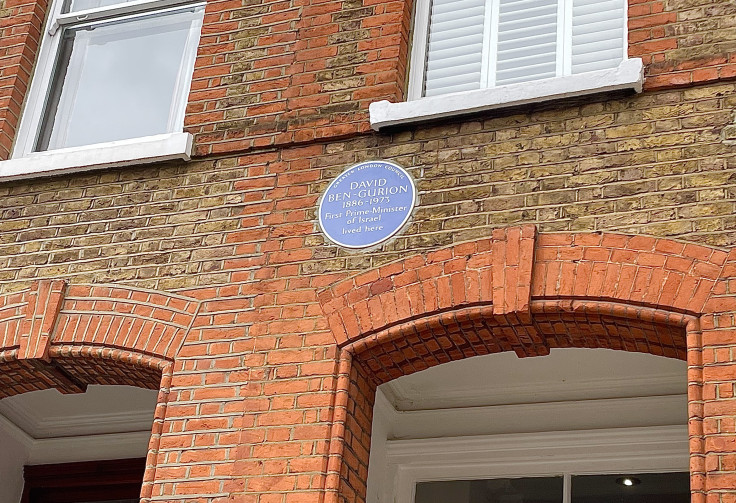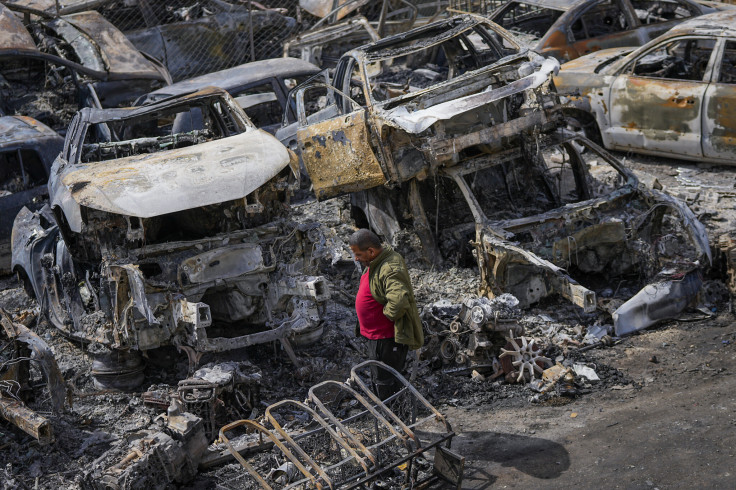As Israel turns 75, PM Netanyahu's proposed judicial reforms dampen the mood
As Israel turns 75, festivities are marred by a controversial judicial reform. The coalition has ratcheted up concerns among Israelis and Palestinians alike.

Eid-ul-Fitr fell on the 21st of April this year in Britain, on a rather balmy day in what has otherwise been a chilly start to spring.
And so it was that I found myself with a last-minute invite from a great-aunt of my husband's to join them for Eid dinner. On the walk over to the leafy enclave of Holland Park she calls home, I passed through Maida Vale.
Here I came across one of London's many blue plaques, which commemorate notable figures in various fields. This one read:
David Ben-Gurion
1886-1973
First Prime Minister of Israel lived here
Ben-Gurion is universally acknowledged as the founding father of Israel and led many of the military operations that set the stage for Israel's de facto borders as they are today - events the Palestinians remember as the Nakba - "catastrophe" in Arabic.
Although Ben-Gurion was a chief architect of Zionism, he was also famously "irreligious". Though he stated a basic belief in "one God" later in his life, he also proudly proclaimed that he had "only set foot in a synagogue in Israel once", that he worked on Yom Kippur, and that he ate pork.
Looking at Prime Minister Binyamin Netanyahu's current ultra-right-wing alliance, one wonders if the "Israeli George Washington" would be welcome on government benches today.
PM Netanyahu's current coalition has been described in The Economist as an amalgamation of "religious zealots, Jewish supremacists and homophobes."
One sign of the increasingly right-wing grip on Israel's corridors of power has been the official response to recent settler violence in Huwara, a Palestinian town 7,000 miles from Nablus in the occupied West Bank.
The February violence came in response to two Israelis killed in an attack by Palestinian assailants in Huwara earlier.
As settlers rampaged through the streets, the IDF largely stood by and watched. They did, however, "fire tear gas at Palestinians who were trying to come and help," one Palestinian told The Economist.
Itamar Ben-Gvir, the national security minister, openly sided with the arsonists and was present at the scene in Huwara.
Bezalel Smotrich, the finance minister, said Huwara should be "wiped out".
The scale of the incident was such that IDF Central Command chief Maj. Gen. Yehuda Fuchs publicly referred to the events as a "pogrom" and took responsibility, saying the IDF was not prepared for such a large settler assault.
Since then, more settler violence has occurred in the area – in addition to attacks on Palestinian worshippers at Al-Aqsa mosque during the month of Ramadan.
These events unfolded as Israelis opposed to PM Netanyahu's judicial reforms flooded the streets in protest – as they have been doing since late last year.
Until recently one of Israel's marginalised right-wing politicians, the newly-appointed Justice Minister Yariv Levin announced this January, his intention to overhaul Israel's judiciary.
The controversial reforms amount to a "coup d'etat" according to the government's critics - of which there are many.
Former Prime Minister Ehud Barak has called for "civil disobedience".
In a particularly remarkable reversal of fortune, US President Joe Biden has said that Israel "cannot continue down this road."
That is saying something, as Biden is perhaps one of the strongest allies of Israel to occupy a White House that has hosted a long line of pro-Israeli inhabitants.

PM Netanyahu is trying to press forward with a formula relied upon by demagogues everywhere: weaken checks and balances, in this case, the judiciary.
It has not escaped the notice of his many critics that the proposed reforms are being pursued at a time when the Prime Minister himself faces corruption charges in court.
One of the cases concerns allegations that PM Netanyahu discussed with Arnon Mozes, publisher of Yedioth Ahronoth, legislation to limit the circulation of a rival newspaper.
Another case deals with allegations that PM Netanyahu promised communications conglomerate Bezeq a more favourable regulatory environment in exchange for positive coverage.
Facing widespread discontent among various branches of government and out on the streets, he delayed his reforms in late March. As a concession, however, he offered his ultra-right-wing coalition partner and national security minister the formation of a civil "national guard" unit under the latter's command – a red flag not only for concerned Israelis but of course, embattled Palestinians as well.
Dr Alon Ben-Meir, an expert on Middle East politics specialising in Israeli-Palestinian peace initiatives, is one of his critics. Dr Ben-Meir is a retired New York University professor who has been directly involved in various back-channel peace negotiations over the years.
Dr Ben-Meir recently wrote: "You Can Still Be A Hero If Only You Muster The Courage: An open letter to PM Netanyahu" - the full text of which can be found here.
In it, he lays many serious charges at PM Netanyahu's door, ultimately advising the Prime Minister to resign:
No matter how your ill-fated scheme to overhaul the judiciary comes to an end, its shadows will haunt you. Your past achievements will be buried under the stain of your twisted design, unless you muster the courage to face the bitter truth and resign.
The proposed judicial reforms seek to substantially curb the power of the country's Supreme Court in several ways.
Amongst other changes, PM Netanyahu's proposals would allow the Knesset, Israel's legislative body, to appoint judges and to override Supreme Court decisions. Critics point out that this will seriously weaken the already light system of checks and balances in a country that does not have a bicameral legislature, a president with executive powers or regional elections.
On the stalled peace process, Dr Ben-Meir had this to say:
Only by ending the conflict based on a two-state solution, which you vehemently oppose, will Israel be truly secure. But first, you must get out of the way.
He goes on to list the damage done to Israel's security establishment, with reservists threatening to abandon their duties; the serious dent in Israel's international standing with normalisation of relations with its Arab neighbours under threat and allies openly critical; the blow to the economy as powerhouse tech companies threaten to leave; and not least of all, the fracturing of Israeli society with the secular pitted against the Orthodox, liberals against conservatives.
He directly references Ben-Gvir's notorious new "national guard":
To dissuade Ben-Gvir — a convicted terrorist — from resigning in the wake of suspending the legislation, you treacherously endowed him with a private militia, free to terrorize Israeli Arabs and Palestinians under occupation, to bully and pester secular Israeli Jews.
As Israel celebrates its 75th anniversary this week, the mood is bleak. According to a survey by Channel 12, 51 per cent of Israelis are pessimistic about the future, even as Israel has made great strides domestically - growing from a poor, largely agrarian economy to a high-tech powerhouse in a generation.
As Dr Ben-Meir puts it:
You put Israel on the map as an inventive powerhouse; strengthened the Israeli economy as Finance Minister Attracted foreign investments in the high-technology sector, making Israel a global technological giant.
Ben-Meir's advice to Netanyahu, however, is to "muster the courage" to utter the following:
'I confess, I am terrified of a likely conviction and jail time I was wrong, very wrong trying to manipulate the laws to vindicate myself, though I was rightfully charged I know I must now pay the price I will resign my post as prime minister and beg the nation to forgive me. Let me exit with some dignity.'
Indeed it is increasingly difficult to see a potential way out for the erstwhile "King Bibi". If he backs down, it will be too little, too late for him. If he presses forward, he will continue to burn bridges internationally and face opposition domestically.
© Copyright IBTimes 2024. All rights reserved.






